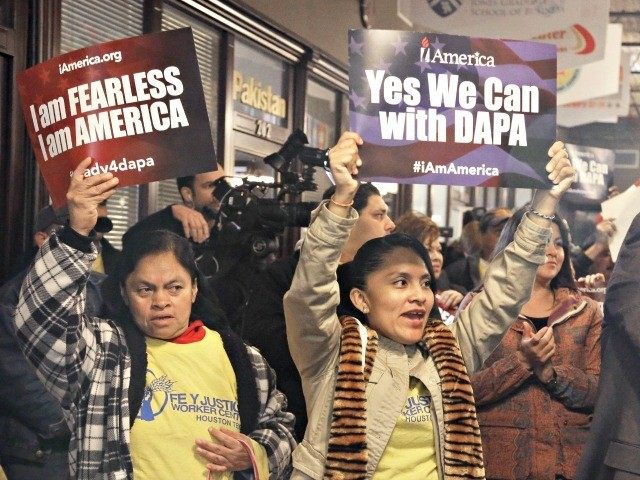The Fifth Circuit Court of Appeals is considering arguments dealing with the injunction a federal district judge placed on President Obama’s executive amnesty.
Texas is leading a coalition of 26 states in a challenge against Obama’s executive actions, and defended U.S. District Judge Andrew Hanen’s February injunction on the orders — which blocked the administration from moving forward with its expansion of Deferred Action for Childhood Arrivals program (DACA) and Deferred Action for Parents of Americans and Lawful Permanent Residents (DAPA) program, efforts expected to grant millions of illegal immigrants legal status and work permits.
Following oral arguments, Texas Attorney General Ken Paxton expressed confidence in the state’s arguments.
“The rule of law matters, and we are confident in our arguments before the Fifth Circuit today as we continue to defend our citizens against President Obama’s unconstitutional amnesty plan,” Paxton said in a statement.
The Texas attorney general further stressed the veracity of the states’ arguments.
“The executive branch is bound by our legal system and U.S. Constitution – it cannot simply create new laws unilaterally,” he added. “The Obama Administration defied this foundational principle when it bypassed our elected leaders to re-write national immigration policy, granting federal and state benefits to law-breaking immigrants, and when it misled a federal judge over the premature implementation of executive amnesty.”
The Obama Justice Department is appealing the Hanen injunction, seeking to have Obama’s executive amnesty programs go forward. According to the Associated Press, the government argued that Texas’ case lacked merit and standing.
“If Texas is right, it could challenge an individual’s right to seek asylum,” Benjamin Mizer, an Obama Justice Department lawyer argued, according to the AP. “The states do not have standing in the downstream effects of a federal immigration policy.”
Texas’ solicitor general Scott Keller, according to the AP, pointed to the costs states like Texas will suffer due to the executive actions.
“This is one of the largest changes in immigration policy in the nation’s history,” The AP quoted Keller.
“We absolutely have a stake,” he added.
The AP’s report noted that of the three justices on the court, the one Obama appointed, Judge Stephen Higginson, appeared more doubtful of the state’s arguments and the justice President George W. Bush appointed, Judge Jennifer Elrod, appeared more receptive. The third judge on the panel was a President Ronald Reagan appointee, Judge Jerry Smith.
Alabama, Arizona, Arkansas, Florida, Georgia, Idaho, Indiana, Kansas, Louisiana, Maine, Michigan, Mississippi, Montana, Nebraska, Nevada, North Carolina, North Dakota, Ohio, Oklahoma, South Carolina, South Dakota, Tennessee, Utah, West Virginia and Wisconsin are joining Texas in it’s legal challenge.

COMMENTS
Please let us know if you're having issues with commenting.